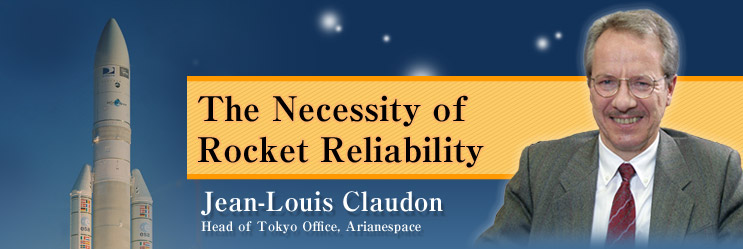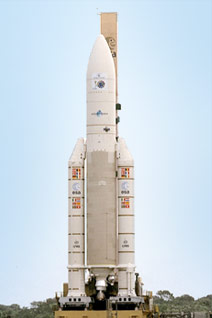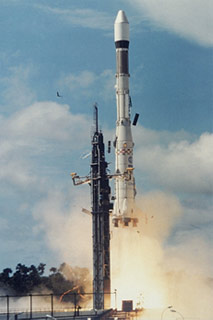

Jean-Louis Claudon, Head of Tokyo Office, Arianespace
Dr. Claudon graduated from the ENSAM (École Nationale Supérieure d'Arts et Métiers) in 1972, and from Brown University in the United States with a Master of Science degree in 1974. After working with a major French automobile manufacturer, Automobiles Peugeot, he went to the Graduate School at the University of Tokyo from 1978, and received a Doctor of Engineering degree from the Institute of Space and Aeronautical Science (now a part of JAXA) in 1981. He was a Commercial Attaché with the French embassy in Japan, in charge of transportation equipment, aeronautics and space commercial affairs. Since 1986 he has been Head of the Tokyo office of Arianespace. In 2001 Dr. Claudon received an MBA degree with honors from the Tokyo campus of the ENPC (École nationale des ponts et chaussées).

European Rocket Ariane 5
(Courtesy of Arianespace)
Q. What types of commercial satellites are in highest demand?
Telecommunications and broadcasting satellites comprise 90 per cent of the market, and our main clients are satellite operating companies. But when you look at governmental satellite launches, Earth observation satellites are primary. This trend hasn't changed much in the last 10 years.
Q. What are the requirements for commercial satellite launchers?
Whether launching commercial or non-commercial satellites, launchers need a high degree of reliability. We earn trust from our clients by providing satisfying results, so having good reliability is the key. The next most important elements are schedules and costs, in other words, to keep launch schedules and to keep costs low.
Q. Why do you think that Arianespace has the largest market share in the commercial satellite launch business?
It's because we specialize in satellite launch services. I think that is the major factor.

First Launch of Ariane 1 on December 24, 1979.(Courtesy of CNES/ESA)
Q. Have Ariane rockets always been targeted for commercial satellite launches?
Ariane launchers used to be governmental rockets, and in the beginning they launched only non-commercial satellites. I'll give you a brief history of rocket development in Europe. When the U.S. was making progress with the Apollo missions in the 1960s, in Europe, France, Germany, and Britain were collaborating on developing a rocket. Unfortunately, this didn't go as hoped, so European countries had no choice but to depend on other countries, the United States and Russia, to launch their satellites, and they set the condition that to the satellites launched would be for strictly non-commercial purposes. We were concerned that this would influence our international status, so we came to the conclusion in 1973 that we would need to develop our own rockets. In 1979 we succeeded in launching our first rocket, Ariane 1. In the following year, 53 companies from 12 European countries founded Arianespace and obtained the operating license for Ariane 1 after its development had been completed.
Our first successful commercial launch was in 1984, but in those early days we were launching only one to three satellites a year, and we did not foresee the coming trend in the commercial application of satellites. It was only after around 1988 that commercial satellites gradually came into use, and in the 1990s we were launching about 10 satellites every year. We've had a 50 to 60 per cent global market share in commercial satellite launch services ever since. More than half of our clients are from non-European countries.
Q. China and India are now trying to get into the market. Do you think that the demand for commercial satellite launches will keep growing in the future?
I don't think that the market will grow much bigger. Between 20 and 25 commercial satellites a year are launched in the world today, and I don't see that the number will increase in the next decade or so. Newcomers will probably have a tough time, as the demand will not be sufficient. Customers prioritize reliability and the experience of their suppliers, so they are not so eager to try new launchers. Demand is not high because most satellites are now used for communications and broadcasting, where more recently fibre-optic cable has made great inroads. So even if more advanced communications increase the demand for commercial launchers, I don't think that the market will grow much for satellite communications. Having said that, there may be room for a new market if new satellite applications other than communications and broadcasting are introduced.